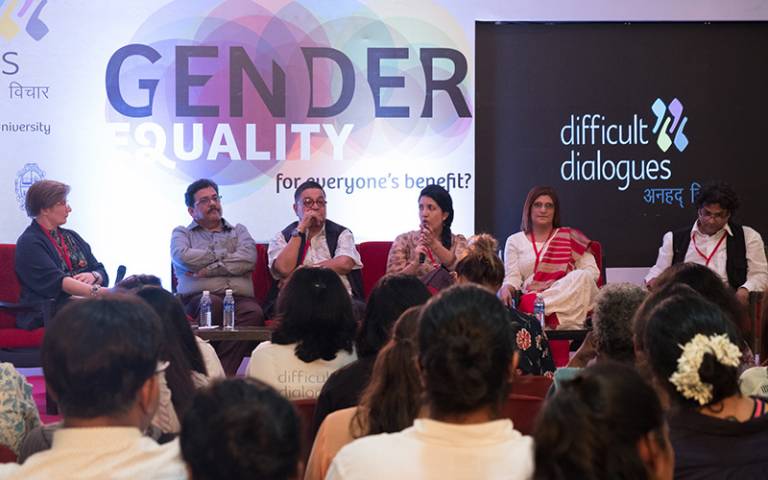UCL academics help shape gender equality policy at Difficult Dialogues 2018, India
14 February 2018
Leading UCL academics joined policy makers, development experts, NGOs and grassroots workers at the 2018 Difficult Dialogues forum in Goa, India

Leading UCL academics joined policy makers, development experts, NGOs and grassroots workers to debate and make recommendations on delivering gender equality at the 2018 Difficult Dialogues forum in Goa.
Academics from UCL’s Institute for Global Health and Institute for Education joined discussions around the annual conference’s theme “Gender Equality – For Everyone’s Benefit?” between 9-11 February.
Difficult Dialogues tackles the most vital issues facing India and South Asia, with the subject of inequality on the basis of gender discrimination identified as a top priority.
Professor Sarah Hawkes (UCL Centre for Gender and Global Health), Professor David Osrin (UCL Institute for Global Health), and Professor Margaret O’Brien (UCL Institute for Education) moderated respective panel discussions on Transforming Gender Norms; Gender, Masculinities and Violence; and Gender and Fatherhood during the event.
Tackling crucial issues
The speakers grappled with the crucial issue of how Indian gender constructs affect fundamental aspects of daily lives and citizenship. Several policy recommendations were generated through the brainstorming and immersion process, including:
- Starting gender education at a young age, highlighting the monumental role that schools could play in shaping gender ideas and transforming mindsets
- Involving fathers in family planning and child health schemes
- Companies having policies in place that encourage young fathers to invest more time in nurturing their families
- Examining the design of entrance exams in science and technology streams to remove gender bias.
- In light of the #MeToo campaign, shifting the focus from post trauma healing to having strong laws and mechanisms to prevent injustice in the first place, involving and sensitizing men so progress continues in a collaborative way.
Professor Hawkes said: “Disruptive thinking about difficult issues is in the DNA of UCL and we are immensely grateful to have had the opportunity to participate in and observe dialogues - both difficult and demanding - on what gender means to us all.
“Throughout the conversations it became clear that gender equality is for the benefit of all of us, everywhere.”
Event partners included Goa University, the International Centre Goa and Brookings India, with NGOs such as SNEHA from Mumbai, PLAN India, PHIA and the Consortium for Street Children also adding their voices to the debate.
 Close
Close

